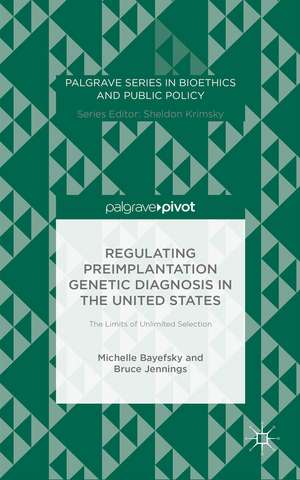Regulating Preimplantation Genetic Diagnosis in the United States: The Limits of Unlimited Selection: Palgrave Series in Bioethics and Public Policy
Autor Michelle Bayefsky, Bruce Jenningsen Limba Engleză Electronic book text – 19 ian 2015
During medically assisted reproduction, preimplantation genetic diagnosis (PGD) can be used to select some embryos for use and to discard others based on their genetic characteristics. The practice of PGD is increasing as genetic testing becomes less expensive and reproductive technologies become more sophisticated, raising difficult ethical questions. The technique is regulated in nearly all other Western countries, but remains unregulated in the United States. As a result, it can and has been used to select for traits such as sex and deafness, as well as children who will be good tissue donors for sick older siblings. This book is a comprehensive and comparative study of the ethics and regulation of PGD. It lays out the competing moral views at stake and analyzes whether and how PGD ought to be regulated in the US in light of current medical, political, and economic realities.
Preț: n/a
Nou
Disponibilitate incertă
Specificații
ISBN-10: 1137515449
Pagini: 124
Ediția:
Editura: Palgrave MacMillan
Colecția Palgrave Pivot
Seria Palgrave Series in Bioethics and Public Policy
Locul publicării:Basingstoke, United Kingdom
Cuprins
1. Introduction
2. The Ethics of PGD and Its Relevance to Regulation
3. Drawing Ethical Lines
4. Regulating PGD in Practice
5. Paying for PGD
6. Conclusion
Recenzii
"Bayefsky and Jennings have written an exceptionally smart and thorough analysis of the ethics, politics, and economics of prenatal genetic testing. A must-read for anyone who cares about the future of reproductive technologies and parenthood." - Thomas H. Murray, President Emeritus and Senior Research Scholar of the Hastings Center, USA
'Women undergoing in vitro fertilization can use preimplantation genetic diagnosis to select among their available embryos in order to implant only those that possess, or lack, certain genetic traits. Bayefsky and Jennings have produced an invaluable guide to the ethical, economic and legal questions surrounding this powerful and controversial technique. The book is comprehensive enough, and accessible enough, to be of interest not only to bioethicists and clinicians, but also to students and to women considering in vitro fertilization.' - Stephen R. Latham, JD, PhD, Director, Yale Interdisciplinary Center for Bioethics, USA
Notă biografică
Michelle Bayefsky is Pre-doctoral fellow in the Bioethics Department of the National Institutes of Health, USA. She has served as an intern at the Senate HELP Committee and UNESCO's Bioethics Programme, and a researcher at Yale's Interdisciplinary Center for Bioethics, USA. She graduated summa cum laude from Yale University, USA in 2014 with a B.A. in Ethics, Politics and Economics.
Bruce Jennings is Director of Bioethics at the Center for Humans and Nature and Senior Advisor at The Hastings Center, USA. He also holds faculty appointments at Vanderbilt University, USA and Yale University, USA. He has written widely on ethics and public policy issues, and is Editor-in-Chief of the influential reference work, Bioethics, 4th Edition (formerly the Encyclopedia of Bioethics), 6 vols. (2014).


